Ever wondered how aging impacts your brain and nerves? Understanding these changes can help you maintain a sharp mind and active body as you grow older.”
As we age, our nervous system undergoes significant changes. Understanding these changes is essential for maintaining cognitive function and overall health. By recognizing the effects of aging on the nervous system, we can adopt strategies to mitigate negative impacts and promote longevity.
The aging process can affect brain function, memory, coordination, and balance. Addressing these changes early can help maintain a high quality of life and independence in older adults.
In this post, you will learn about the changes in the nervous system with aging and discover effective strategies to maintain nervous system health in older adults.
Changes in the Nervous System with Aging
As people age, their nervous system undergoes various physiological changes. These changes can impact brain structure and function, as well as the health of nerve cells, influencing overall cognitive and physical abilities.
- Brain Volume Reduction:
- Brain volume tends to decrease with age due to the loss of neurons and shrinkage of brain tissue.
- This reduction can impact cognitive functions like memory and decision-making. For instance, an older adult might find it harder to remember names or multitask effectively.
- Neuron Function and Communication:
- The efficiency of neuron communication declines, which can affect processing speed and reflexes.
- Slower synaptic transmission can lead to longer reaction times. For example, an elderly person might react more slowly to sudden changes while driving.
- Blood Flow and Metabolism:
- Reduced cerebral blood flow and slower metabolic processes can impair brain function.
- Decreased blood flow can lead to less oxygen and nutrient supply to the brain, affecting its performance. This can manifest as difficulty concentrating or feeling mentally fatigued more quickly.
- Myelin Sheath Degradation:
- The protective myelin sheath around nerves can degrade, slowing down nerve signal transmission.
- This degradation can contribute to issues with coordination and balance, making older adults more prone to falls and injuries.
Describe an infographic showing the aging brain with labeled changes, such as reduced brain volume, slower neuron communication, and myelin sheath degradation.
Strategies to Maintain Nervous System Health in Older Adults
Outline practical strategies that older adults can adopt to support and maintain nervous system health, focusing on lifestyle choices, diet, and mental exercises.
- Physical Exercise:
- Regular physical activity can enhance blood flow to the brain and promote the release of neuroprotective factors.
- Suggest incorporating aerobic exercises, strength training, and balance exercises.
- Highlight the benefits of activities like walking, swimming, and yoga.
- Cognitive Engagement:
- Keeping the brain active through mental exercises can promote neuroplasticity and cognitive reserve.
- Encourage engaging in puzzles, reading, learning new skills, and social interactions.
- Provide examples of activities such as learning a new language or playing strategy games.
- Healthy Diet:
- A diet rich in antioxidants, omega-3 fatty acids, and essential vitamins can support brain health.
- Recommend foods like berries, leafy greens, fatty fish, nuts, and seeds.
- Discuss the benefits of the Mediterranean diet for maintaining cognitive function.
- Stress Management:
- Chronic stress can accelerate aging effects on the nervous system; managing stress is crucial.
- Promote relaxation techniques such as meditation, deep breathing exercises, and mindfulness.
- Explain how regular practice of mindfulness meditation can reduce stress and improve brain health.
- Sleep Hygiene:
- Quality sleep is vital for brain health and cognitive function.
- Suggest maintaining a regular sleep schedule, creating a restful environment, and avoiding stimulants before bedtime.
- Provide tips for improving sleep hygiene, such as establishing a bedtime routine and reducing screen time before bed.
Recap the changes in the nervous system that come with aging and the strategies to maintain nervous system health in older adults.

